 MyDogBreeds
MyDogBreeds Russo-European Laika is originated from Russia but Petit Bleu de Gascogne is originated from France. Both Russo-European Laika and Petit Bleu de Gascogne are having almost same height. Both Russo-European Laika and Petit Bleu de Gascogne are having almost same weight. Both Russo-European Laika and Petit Bleu de Gascogne has almost same life span. Both Russo-European Laika and Petit Bleu de Gascogne has almost same litter size. Both Russo-European Laika and Petit Bleu de Gascogne requires Low maintenance.
Russo-European Laika is originated from Russia but Petit Bleu de Gascogne is originated from France. Both Russo-European Laika and Petit Bleu de Gascogne are having almost same height. Both Russo-European Laika and Petit Bleu de Gascogne are having almost same weight. Both Russo-European Laika and Petit Bleu de Gascogne has almost same life span. Both Russo-European Laika and Petit Bleu de Gascogne has almost same litter size. Both Russo-European Laika and Petit Bleu de Gascogne requires Low maintenance.
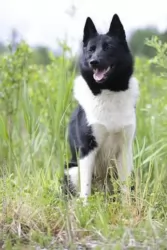 The Russo-European Laika is a hunting dog that comes from Russia.
The Russo-European Laika is a hunting dog that comes from Russia.
It is a dog that has been developed from Spitz type dogs. A breeding program was started for the dog in 1944.
The Russo-European Laika dog is recognized by the Federation Cynologique Internationale in the Spitz and Primitive type group.
 The Petit Bleu de Gascogne is a scenthound dog originating in France where he has always been used as a hunting dog.
The Petit Bleu de Gascogne is a scenthound dog originating in France where he has always been used as a hunting dog.
The Petit Bleu de Gascogne is a descendant of the Grand Bleu de Gascogne. This dog was developed around the 16th century already, with the numbers of the dog being reduced at the time of the World Wars.
They’re quite well known in France, but not in any other parts of the world. The dog is an official member of the UKC, and it was in 1991 that the dog joined their scent hound group.
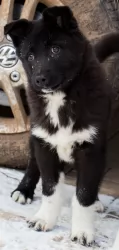 The Russo-European Laika is a medium sized dog Spitz dog that stands at between 54 to 60cm in height and weighs in the region of 20 – 23kg.
The Russo-European Laika is a medium sized dog Spitz dog that stands at between 54 to 60cm in height and weighs in the region of 20 – 23kg.
The dog has quite a strong resemblance to the Karelia Bear Dog. They are sometimes mistaken for each other.
The Russo-European Laika has the typical triangular shaped head with small dark eyes, a black nose and erect, pointed ears. These are deep chested dogs.
As with other Spitz breeds, this dog has a thick fur with a densely furred tail which is curved over the back. The double coat is fairly long and usually a dark grey color or black with some white markings. Sometimes the dog has a white coat.
This is a lively, energetic dog breed that loves to spend time outdoors. It has always been used to alert hunters to prey, using its bark to alert the hunter.Training and socialization will be necessary for the dog if you don’t want it to be barking in the house too.
He makes an excellent guard dog, protecting his human family. It is very tolerant of children too, getting on well with them as well as other pets.
The dog is known for being totally devoted to its family, being an affectionate and loyal breed that doubles as a family pet and guard dog.
 The Petit Bleu de Gascogne is a medium to large sized dog which stands at between 52 to 58cm in height at the withers and weighs in the region of 18 to 22kg.
The Petit Bleu de Gascogne is a medium to large sized dog which stands at between 52 to 58cm in height at the withers and weighs in the region of 18 to 22kg.
In fact, the only difference between the Petit Bleu de Gascogne and the original Bleu de Gascogne is its size. They’re well proportioned dogs and they have lean, muscular bodies. The head is long and slim, the nose black, the expression gentle and unthreatening.
Most times you’ll find a black patch on each side of the head which extends to the ears so that the ears are essentially black. The patch also extends to around the eyes.
The dense, short coat is a typical trademark feature, with the color of the coat being white mottled with black so that the general appearance is a slate blue color. The dog usually has tan eyebrows over each eye. The tail is long and the ears long and floppy.
Kept essentially as a pet today, the Petit Bleu de Gascogne has kept its hunting instincts and is an excellent scent-dog, being able to follow a scent for miles. It is why you want to ensure that as a pet, you take him on regular walks, every day in fact. He just loves to get out, and given the chance to run and chase a scent.
Apart from his hunting skills, he still makes an excellent pet, being loyal and loving with his human family. He is looked upon as being amicable and well-balanced, getting on well with children as well as dogs in the home.
They’re quite laid-back and friendly, so they don’t make particularly good watchdogs. They are independent and intelligent and will respond well to training and socialization.
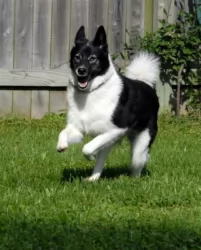 This is an intelligent dog breed, loving the time he spends with his human family but reluctant to be patted by strangers.
This is an intelligent dog breed, loving the time he spends with his human family but reluctant to be patted by strangers.
They also get along with pets that they have grown up with. They get on well with kids and make great watchdogs too. Small wonder they make such sought after pets and companions.
 The Petit Bleu de Gascogne just loves being outdoors, chasing the scent of something interesting. He is in his element outside as a hunting or tracking dog.
The Petit Bleu de Gascogne just loves being outdoors, chasing the scent of something interesting. He is in his element outside as a hunting or tracking dog.
Training and socialization will always be a good idea for these dogs, as once on the scent he may be inclined to ignore your calls and not return easily.
They’re easy-going dogs, loving be around their human family. Provide well for him and you will find that he makes an amicable, loyal and devoted companion.
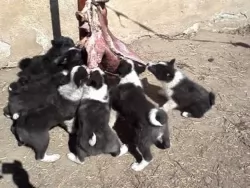 These Spitz type dogs are always known to enjoy good health, and owners don’t have to worry too much about their health as only a small number of health issues are reported with this healthy dog breed.
These Spitz type dogs are always known to enjoy good health, and owners don’t have to worry too much about their health as only a small number of health issues are reported with this healthy dog breed.
This is a congenital defect in the abdominal muscles and can result in fat or tissues being evident under the skin. A bulge is often seen in the area of the abdomen. Larger hernias will require surgery.
 The Petit Bleu de Gascogne is a healthy dog with no unusual health problems being documented. With good care, he can generally live to be 11, 12 or 13 years of age. Nonetheless it is a good idea to be aware of some of the horrible dog illnesses that can strike, even though it is highly unlikely.
The Petit Bleu de Gascogne is a healthy dog with no unusual health problems being documented. With good care, he can generally live to be 11, 12 or 13 years of age. Nonetheless it is a good idea to be aware of some of the horrible dog illnesses that can strike, even though it is highly unlikely.
Your Petit Bleu de Gascogne is a deep chested dog and this simply means it can develop bloat. A swollen stomach, lethargy and trying to vomit are just some of the signs of this ailment which can become deadly if not attended to. The stomach can twist with bloat and this is when things get serious.
Floppy eared dogs are always at risk of ear infections and these can be painful for your pet. You will notice him scratching at his ears or shaking his head and then its time to investigate further for redness or discharge.
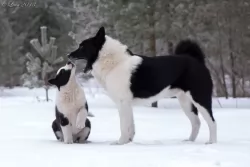 This is an energetic dog and will require a good amount of excerise. This dog isn’t suited to living in the city as they are highly active. Apart from wanting large grounds to run around in, he will need walks as well as ball- and rope games to keep him busy.
This is an energetic dog and will require a good amount of excerise. This dog isn’t suited to living in the city as they are highly active. Apart from wanting large grounds to run around in, he will need walks as well as ball- and rope games to keep him busy.
He is intelligent and needs some form of mental stimulation. There are good quality toys which one can buy for these dogs than can make them think.
Many things can change a dog’s longevity, and diet is one. A good nutritious diet with vitamins and minerals will give your dog less of a chance to get sick.
If you go for the best quality commercially manufactured dog foods, you’ll find that they are both convenient and well balanced.
To provide your dog with just a bit of variety in his diet, some home-made food added into the dry kibble from time to time will delight your pet.
No need to make preparing the food a huge issue either. Boil brown rice and chicken in a pot and add in sweet potatoes, carrots and spinach. Chop all this up and add small portions of it into the dry kibble.
Try to include a bit of raw meat occasionally and never let your dog be without a constant source of fresh, cool water
 Luckily the Petit Bleu de Gascogne is a fairly low maintenance dog who will basically require a good brush twice a week to rid him of loose hairs and to keep his coat nice and shiny.
Luckily the Petit Bleu de Gascogne is a fairly low maintenance dog who will basically require a good brush twice a week to rid him of loose hairs and to keep his coat nice and shiny.
Take the time while brushing him to test for any unusual lumps on his body. Check inside his ears too, because as a floppy eared dog, there can be a build-up of wax, debris and dampness and these can all cause bacteria and an ear infection.
Check his eyes too as well as inside his mouth. He can’t tell you when he’s got terrible tooth ache from a rotting tooth and you need to check for this. Bad teeth can cause all kinds of health issues.
There are some excellent commercially manufactured dog foods on the market which have got the vitamins and minerals your pet needs. Some of the lower quality foods have got bad ingredients such as colorants and fillers and these can actually be toxic for your pet.
It’s always wise to add a little bit of home-made food into your pet’s diet and then simple, nutritious foods such as boiled chicken, brown rice or pasta, sweet potatoes, carrots and spinach can do him the world of good. Just chop it up and add it into the dried kibble every other night when you feed your pet. A bit of raw meat occasionally can also be healthy for him.
Always ensure there’s a bowl of fresh, cool water available to him.
Ensure your pet has a nice comfortable, dry place to sleep.
Never ever leave your pet alone in a hot car.
Make sure your puppy has his puppy vaccines to avoid some life-threatening diseases.
Have your dog spayed or neutered to avoid unwanted puppies.